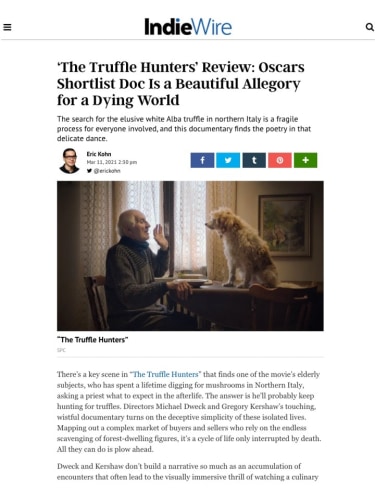‘The Truffle Hunters’ Review: Oscars Shortlist Doc Is a Beautiful Allegory for a Dying World
IndieWire
03/11/2021
Back
The search for the elusive white Alba truffle in northern Italy is a fragile process for everyone involved, and this documentary finds the poetry in that delicate dance.
By Eric Kohn
There’s a key scene in “The Truffle Hunters” that finds one of the movie’s elderly subjects, who has spent a lifetime digging for mushrooms in Northern Italy, asking a priest what to expect in the afterlife. The answer is he’ll probably keep hunting for truffles. Directors Michael Dweck and Gregory Kershaw’s touching, wistful documentary turns on the deceptive simplicity of these isolated lives. Mapping out a complex market of buyers and sellers who rely on the endless scavenging of forest-dwelling figures, it’s a cycle of life only interrupted by death. All they can do is plow ahead.
Dweck and Kershaw don’t build a narrative so much as an accumulation of encounters that often lead to the visually immersive thrill of watching a culinary ecosystem come to life. In the wilds of the countryside, these acetic figures roam vast patches of forestry with trusty truffle-sniffing dogs by their side. Drone shots capture man and dog as solitary figures in vast, empty greenery, like some sort of distant cave painting. At the other end of the spectrum, miniature lenses affixed to the canine hunting companions provide a clever contrast: Dog-cams speed through dirt and plants, with no objective other than the mission at hand.
The micro and macro create the impression of a powerful, instinctive commitment, one made all the more poignant because it could collapse at any second. “They know nothing of the forest, but they plunder it,” one veteran hunter tells another. He’s referencing the mad dash to acquire the rare white Alba truffles, each of which commands thousands of euros from high-end restaurants worldwide. Far away from the dirty work, greedy businessmen demand results.
The eccentric men who wander through Dweck and Kershaw’s fly-on-the-wall portrait don’t always grasp the big picture, but they feel its grip. Aurelio, the 84-year-old truffle-hunting legend, makes this clear when an up-and-comer pleads with him to share his favorite spots. The denial comes hard and fast. Even the filmmakers don’t get that close. In an age defined by digital maps and universal access, truffle hunters fight for the secrecy that protects their livelihood.
We watch as the hunters talk through the peculiar nature of their surroundings, with their dogs as the main audience. For Aurelio, who has no wife or family, his trusty hound Birba provides all the companionship he needs. Sharing a snack with Birba in their rickety home, the man wonders what will happen to the dog when he dies. Carlo, who’s 88, sometimes roams out of the house at night with his own dog, as his wife worries that one day he might not return. And Angelo, a bitter hermit who spouts poetry from his typewriter with a glass of wine by his side, gave up on the profession after other hunters poisoned his dogs. It’s fascinating to watch the men ruminate about a process invisible to the rest of the world, even as it exploits them. “The Truffle Hunters” also foregrounds their mortality, the ticking clock that could find this tapestry blinking out of existence with little notice.
The movie works as a beautiful allegory for many aspects of the Earth’s most pressing concerns, from climate change to capitalist destruction. By hovering in lavish presentations to prospective buyers and shadowy bargaining sessions alike, “The Truffle Hunters” shows just how much impact each truffle can bring in a fast-paced industry, even as the people most responsible for sustaining it live in destitution.
“The Truffle Hunters” boasts Italian auteur Luca Guadagnino as one of its producers, and it’s no surprise that the country’s reigning king of elegance and fragility would take an interest in the subject; it’s practically an extension of his aesthetic. The movie falls short of creating a singular argument, and the effect of its poetic visuals drifts off by the end. Still, it excels at diving into the essence of a business that’s antithetical to modern-day supply and demand.
Truffle hunters know nothing of economics; they exist in a discrete universe of sensual instincts. This is epitomized by one telling closeup of a truffle hunter’s nose, breathing deeply during a doctor visit. “A truffle without aroma would not be worth nothing,” one man says. It’s a shame the movie can’t take advantage of the Smell-O-Vision technology; “The Truffle Hunters” works overtime to convey its delicate process, but the precise skill in question belongs only to its subjects and the movie lets them keep the secret safe.
Grade: B+
“The Truffle Hunters” is now playing in theaters and virtual cinemas nationwide from Sony Pictures Classics.